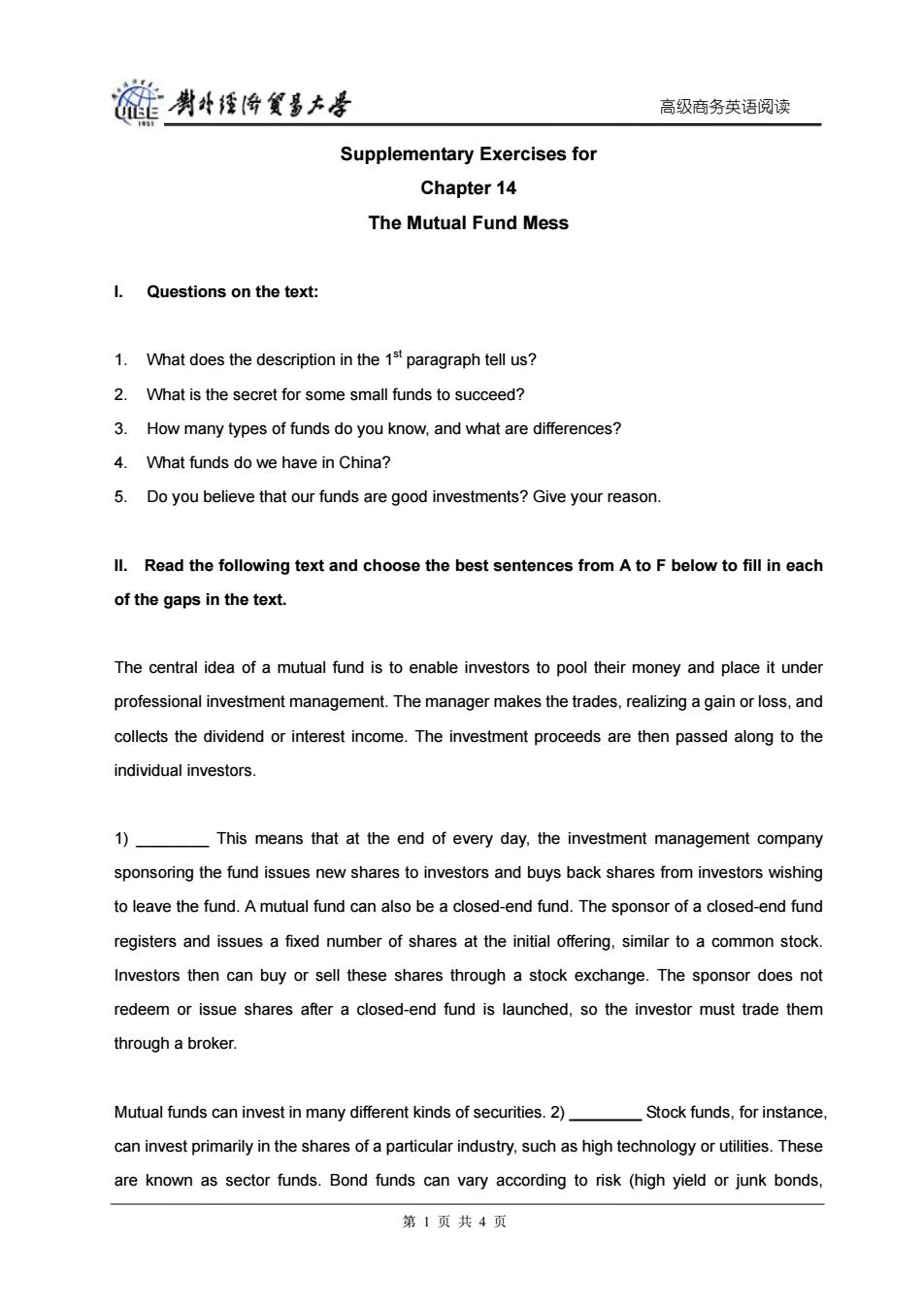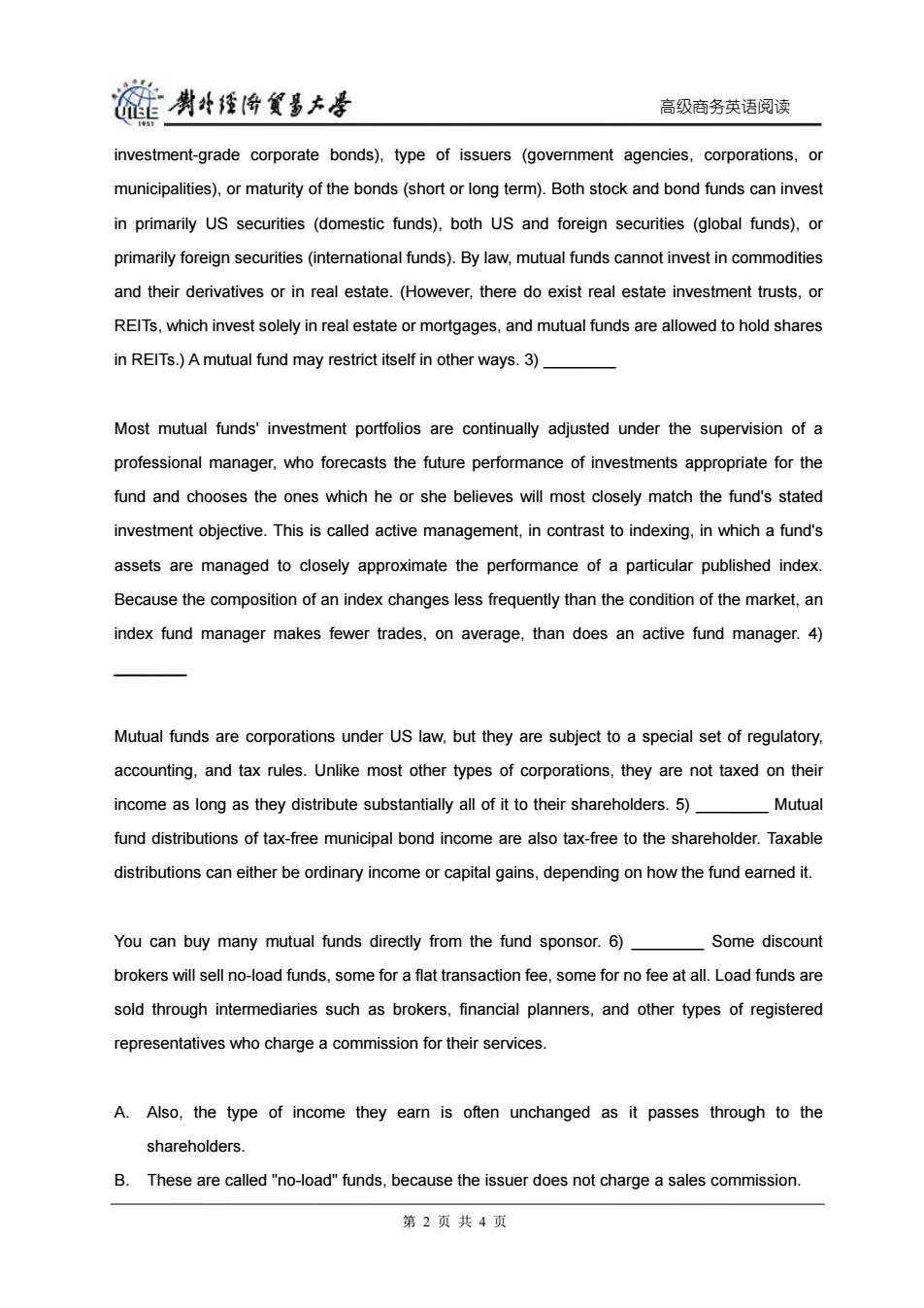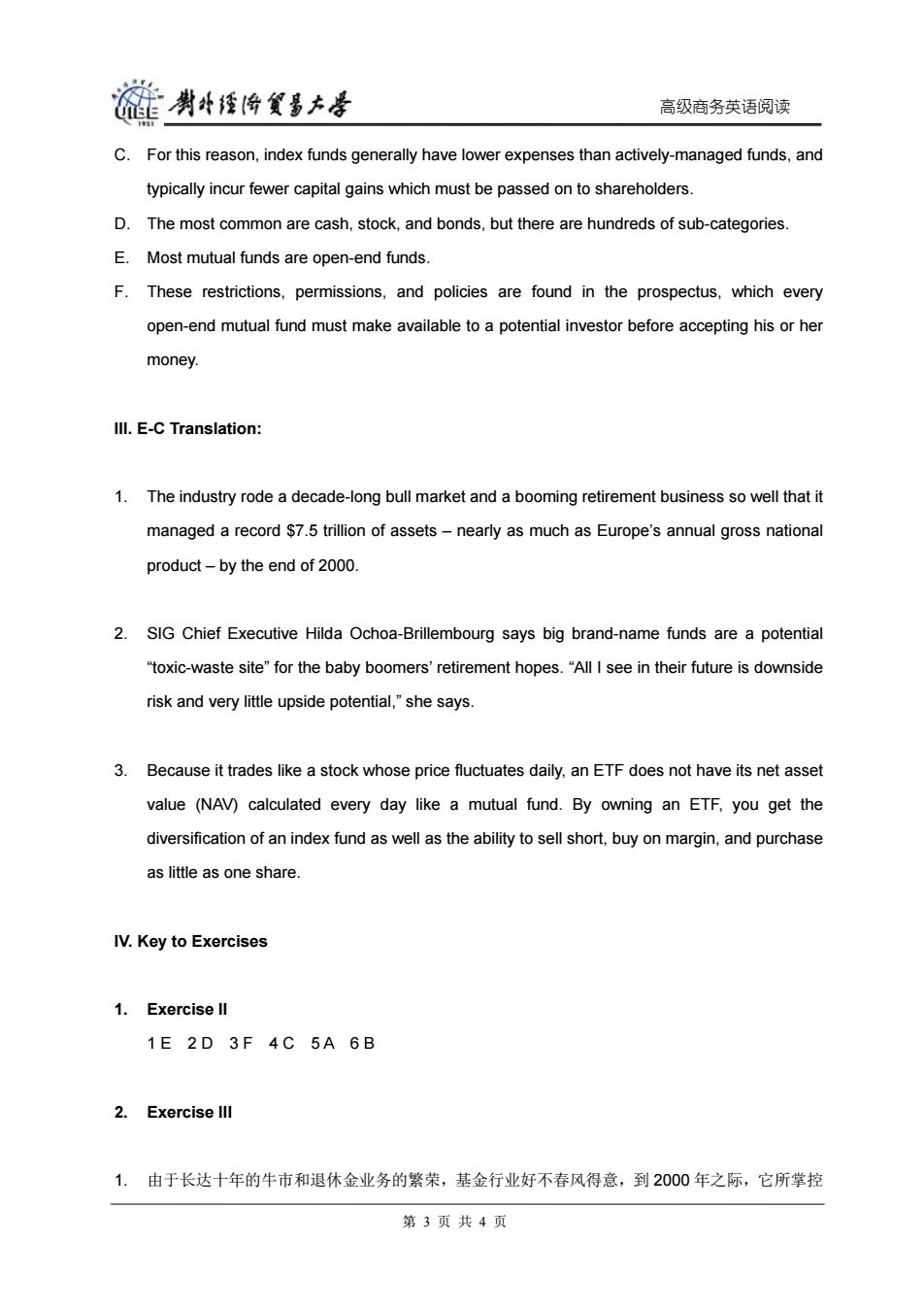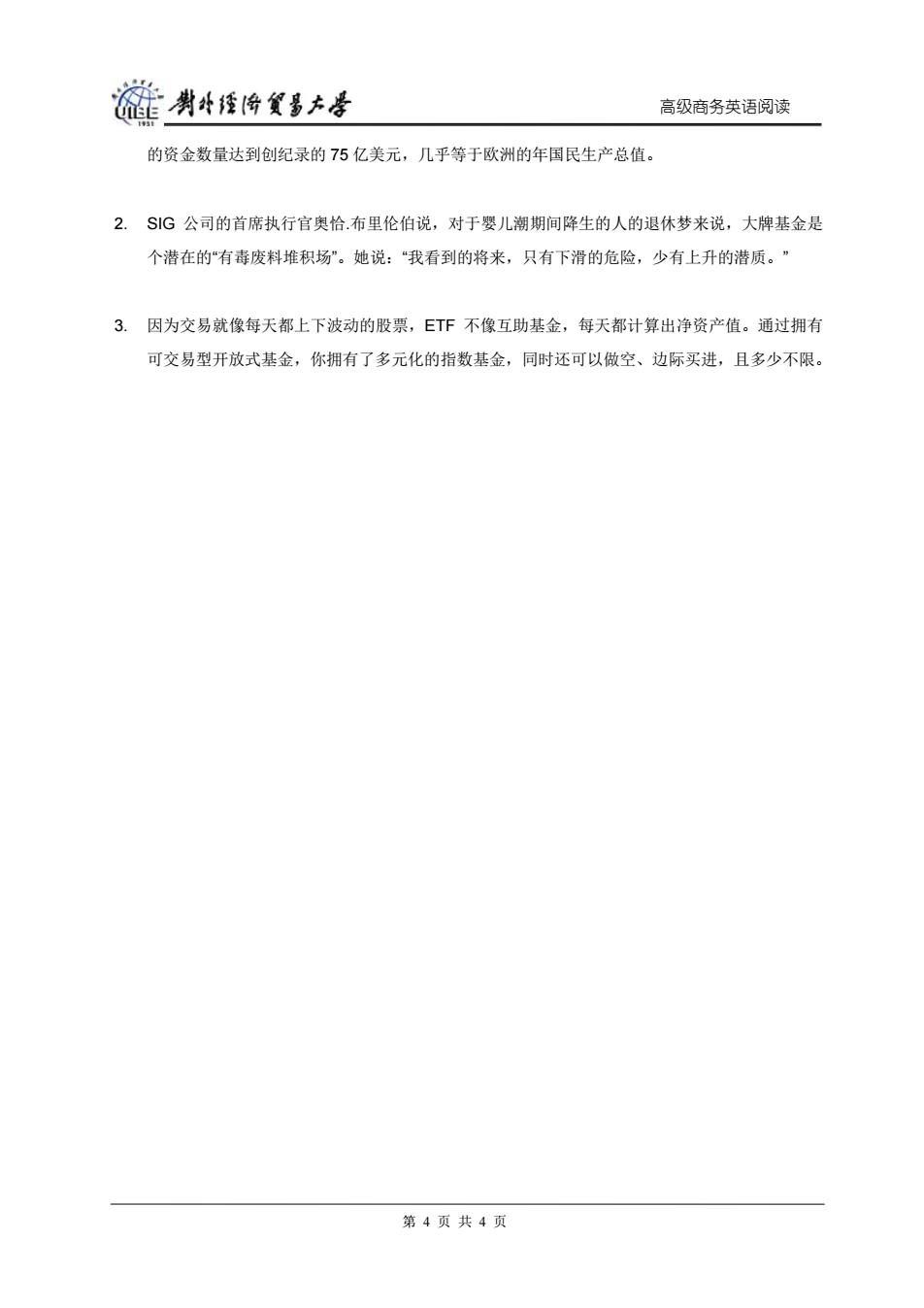
链典4矮降贸多大 高级商务英语阅读 Supplementary Exercises for Chapter 14 The Mutual Fund Mess . Questions on the text: 1.What does the description in the 1st paragraph tell us? 2.What is the secret for some small funds to succeed? 3.How many types of funds do you know,and what are differences? 4.What funds do we have in China? 5.Do you believe that our funds are good investments?Give your reason. ll.Read the following text and choose the best sentences from A to F below to fill in each of the gaps in the text. The central idea of a mutual fund is to enable investors to pool their money and place it under professional investment management.The manager makes the trades,realizing a gain or loss,and collects the dividend or interest income.The investment proceeds are then passed along to the individual investors. 1) _This means that at the end of every day,the investment management company sponsoring the fund issues new shares to investors and buys back shares from investors wishing to leave the fund.A mutual fund can also be a closed-end fund.The sponsor of a closed-end fund registers and issues a fixed number of shares at the initial offering,similar to a common stock. Investors then can buy or sell these shares through a stock exchange.The sponsor does not redeem or issue shares after a closed-end fund is launched,so the investor must trade them through a broker. Mutual funds can invest in many different kinds of securities.2) Stock funds,for instance. can invest primarily in the shares of a particular industry,such as high technology or utilities.These are known as sector funds.Bond funds can vary according to risk (high yield or junk bonds, 第1页共4页
高级商务英语阅读 Supplementary Exercises for Chapter 14 The Mutual Fund Mess I. Questions on the text: 1. What does the description in the 1st paragraph tell us? 2. What is the secret for some small funds to succeed? 3. How many types of funds do you know, and what are differences? 4. What funds do we have in China? 5. Do you believe that our funds are good investments? Give your reason. II. Read the following text and choose the best sentences from A to F below to fill in each of the gaps in the text. The central idea of a mutual fund is to enable investors to pool their money and place it under professional investment management. The manager makes the trades, realizing a gain or loss, and collects the dividend or interest income. The investment proceeds are then passed along to the individual investors. 1) ________ This means that at the end of every day, the investment management company sponsoring the fund issues new shares to investors and buys back shares from investors wishing to leave the fund. A mutual fund can also be a closed-end fund. The sponsor of a closed-end fund registers and issues a fixed number of shares at the initial offering, similar to a common stock. Investors then can buy or sell these shares through a stock exchange. The sponsor does not redeem or issue shares after a closed-end fund is launched, so the investor must trade them through a broker. Mutual funds can invest in many different kinds of securities. 2) ________ Stock funds, for instance, can invest primarily in the shares of a particular industry, such as high technology or utilities. These are known as sector funds. Bond funds can vary according to risk (high yield or junk bonds, 第 1 页 共 4 页

喇牛煙将多大是 高级商务英语阅读 investment-grade corporate bonds),type of issuers (government agencies,corporations,or municipalities),or maturity of the bonds(short or long term).Both stock and bond funds can invest in primarily US securities (domestic funds),both US and foreign securities (global funds),or primarily foreign securities(international funds).By law,mutual funds cannot invest in commodities and their derivatives or in real estate.(However,there do exist real estate investment trusts,or REITs,which invest solely in real estate or mortgages,and mutual funds are allowed to hold shares in REITs.)A mutual fund may restrict itself in other ways.3) Most mutual funds'investment portfolios are continually adjusted under the supervision of a professional manager,who forecasts the future performance of investments appropriate for the fund and chooses the ones which he or she believes will most closely match the fund's stated investment objective.This is called active management,in contrast to indexing,in which a fund's assets are managed to closely approximate the performance of a particular published index. Because the composition of an index changes less frequently than the condition of the market,an index fund manager makes fewer trades,on average,than does an active fund manager.4) Mutual funds are corporations under US law,but they are subject to a special set of regulatory. accounting,and tax rules.Unlike most other types of corporations,they are not taxed on their income as long as they distribute substantially all of it to their shareholders.5) Mutual fund distributions of tax-free municipal bond income are also tax-free to the shareholder.Taxable distributions can either be ordinary income or capital gains,depending on how the fund earned it. You can buy many mutual funds directly from the fund sponsor.6)_ Some discount brokers will sell no-load funds,some for a flat transaction fee,some for no fee at all.Load funds are sold through intermediaries such as brokers,financial planners,and other types of registered representatives who charge a commission for their services. A.Also,the type of income they earn is often unchanged as it passes through to the shareholders. B.These are called "no-load"funds,because the issuer does not charge a sales commission. 第2页共4页
高级商务英语阅读 investment-grade corporate bonds), type of issuers (government agencies, corporations, or municipalities), or maturity of the bonds (short or long term). Both stock and bond funds can invest in primarily US securities (domestic funds), both US and foreign securities (global funds), or primarily foreign securities (international funds). By law, mutual funds cannot invest in commodities and their derivatives or in real estate. (However, there do exist real estate investment trusts, or REITs, which invest solely in real estate or mortgages, and mutual funds are allowed to hold shares in REITs.) A mutual fund may restrict itself in other ways. 3) ________ Most mutual funds' investment portfolios are continually adjusted under the supervision of a professional manager, who forecasts the future performance of investments appropriate for the fund and chooses the ones which he or she believes will most closely match the fund's stated investment objective. This is called active management, in contrast to indexing, in which a fund's assets are managed to closely approximate the performance of a particular published index. Because the composition of an index changes less frequently than the condition of the market, an index fund manager makes fewer trades, on average, than does an active fund manager. 4) ________ Mutual funds are corporations under US law, but they are subject to a special set of regulatory, accounting, and tax rules. Unlike most other types of corporations, they are not taxed on their income as long as they distribute substantially all of it to their shareholders. 5) ________ Mutual fund distributions of tax-free municipal bond income are also tax-free to the shareholder. Taxable distributions can either be ordinary income or capital gains, depending on how the fund earned it. You can buy many mutual funds directly from the fund sponsor. 6) ________ Some discount brokers will sell no-load funds, some for a flat transaction fee, some for no fee at all. Load funds are sold through intermediaries such as brokers, financial planners, and other types of registered representatives who charge a commission for their services. A. Also, the type of income they earn is often unchanged as it passes through to the shareholders. B. These are called "no-load" funds, because the issuer does not charge a sales commission. 第 2 页 共 4 页

碰男华经海贸多大学 高级商务英语阅读 C.For this reason,index funds generally have lower expenses than actively-managed funds,and typically incur fewer capital gains which must be passed on to shareholders. D.The most common are cash,stock,and bonds,but there are hundreds of sub-categories. E.Most mutual funds are open-end funds. F.These restrictions,permissions,and policies are found in the prospectus,which every open-end mutual fund must make available to a potential investor before accepting his or her money. Ill.E-C Translation: 1.The industry rode a decade-long bull market and a booming retirement business so well that it managed a record $7.5 trillion of assets-nearly as much as Europe's annual gross national product-by the end of 2000. 2.SIG Chief Executive Hilda Ochoa-Brillembourg says big brand-name funds are a potential "toxic-waste site"for the baby boomers'retirement hopes."All I see in their future is downside risk and very little upside potential,"she says. 3.Because it trades like a stock whose price fluctuates daily,an ETF does not have its net asset value (NAV)calculated every day like a mutual fund.By owning an ETF,you get the diversification of an index fund as well as the ability to sell short,buy on margin,and purchase as little as one share. IV.Key to Exercises 1.Exercise ll 1E 2D 3F 4C 5A6B 2.Exercise lll 1.由于长达十年的牛市和退休金业务的繁荣,基金行业好不春风得意,到2000年之际,它所掌控 第3页共4页
高级商务英语阅读 C. For this reason, index funds generally have lower expenses than actively-managed funds, and typically incur fewer capital gains which must be passed on to shareholders. D. The most common are cash, stock, and bonds, but there are hundreds of sub-categories. E. Most mutual funds are open-end funds. F. These restrictions, permissions, and policies are found in the prospectus, which every open-end mutual fund must make available to a potential investor before accepting his or her money. III. E-C Translation: 1. The industry rode a decade-long bull market and a booming retirement business so well that it managed a record $7.5 trillion of assets – nearly as much as Europe’s annual gross national product – by the end of 2000. 2. SIG Chief Executive Hilda Ochoa-Brillembourg says big brand-name funds are a potential “toxic-waste site” for the baby boomers’ retirement hopes. “All I see in their future is downside risk and very little upside potential,” she says. 3. Because it trades like a stock whose price fluctuates daily, an ETF does not have its net asset value (NAV) calculated every day like a mutual fund. By owning an ETF, you get the diversification of an index fund as well as the ability to sell short, buy on margin, and purchase as little as one share. IV. Key to Exercises 1. Exercise II 1 E 2 D 3 F 4 C 5 A 6 B 2. Exercise III 1. 由于长达十年的牛市和退休金业务的繁荣,基金行业好不春风得意,到 2000 年之际,它所掌控 第 3 页 共 4 页

碰男华挂海贸多大学 高级商务英语阅读 的资金数量达到创纪录的75亿美元,几乎等于欧洲的年国民生产总值。 2.SG公司的首席执行官奥恰.布里伦伯说,对于婴儿潮期间降生的人的退休梦来说,大牌基金是 个潜在的“有毒废料堆积场”。她说:“我看到的将来,只有下滑的危险,少有上升的潜质。” 3.因为交易就像每天都上下波动的股票,ETF不像互助基金,每天都计算出净资产值。通过拥有 可交易型开放式基金,你拥有了多元化的指数基金,同时还可以做空、边际买进,且多少不限。 第4页共4页
高级商务英语阅读 的资金数量达到创纪录的 75 亿美元,几乎等于欧洲的年国民生产总值。 2. SIG 公司的首席执行官奥恰.布里伦伯说,对于婴儿潮期间降生的人的退休梦来说,大牌基金是 个潜在的“有毒废料堆积场”。她说:“我看到的将来,只有下滑的危险,少有上升的潜质。” 3. 因为交易就像每天都上下波动的股票,ETF 不像互助基金,每天都计算出净资产值。通过拥有 可交易型开放式基金,你拥有了多元化的指数基金,同时还可以做空、边际买进,且多少不限。 第 4 页 共 4 页